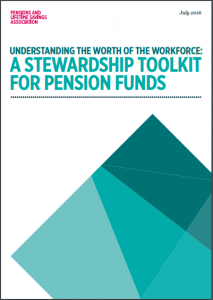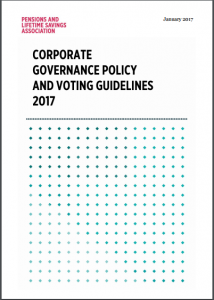January Insight – PLSA members demand more accountability
The Pensions and Lifetime Savings Association (PLSA) is the UK body in charge of helping pension professionals run better pension schemes, representing £1 trillion in assets, and over 400 businesses. Lately, PLSA produced a survey, published as part of its AGM Season Report 2016, which highlights its members' concerns over corporate executive pay. The findings of the survey have been incorporated into the PLSA’s corporate governance policy and voting guidelines, issued on the 18th of January 2017, advising UK pension funds on stewardship and voting practices at company AGMs.

 The survey and revised guidelines come close on the heels of a UK Government Green Paper on Corporate Governance which looks at things such as shareholder say on pay, as part of Theresa May's commitment to boosting the UK corporate governance regime.
The survey and revised guidelines come close on the heels of a UK Government Green Paper on Corporate Governance which looks at things such as shareholder say on pay, as part of Theresa May's commitment to boosting the UK corporate governance regime.
Eurosif spoke to Luke Hildyard, the PLSA's Policy Lead on Stewardship and Corporate Governance.
Eurosif: As your survey results come out, what are the views of your membership?
LH: An emphatic 80% of respondents to the survey felt that executive pay levels are simply too high. Interestingly, 63% of these said pay was too high for all executives, while 37% said it was too high for those who perform poorly. There is an understandable concern about ‘rewards for failure’ but our members think that pay is unjustifiably high, more than is fair or proportionate, for all CEOs. This does suggest that a debate that is often focused on intricate tweaks to the structure of CEO pay packages should look at the more fundamental question of their size.
The Stewardship Code has received much recognition as an example of the UK's undoubted superiority in the field of corporate governance. Many countries both in Europe and further abroad have transposed parts of it. Do you think more work needs to be done and if so where?
LH: I wouldn’t wish to be too complacent about the UK’s standards of corporate governance, but the stewardship code was a welcome innovation and we are pleased to see it influencing developments in other countries. The UK’s Financial Reporting Council has issued a new ‘tiered structure’ for the Stewardship Code and which will help asset owners to identify the managers and service providers with the clearest approach of stewardship. However, investors should always be thinking about how they can be more constructive and effective stewards of their investments – our stewardship central website provides a number of resources to help members engage with current and prospective investment managers and investee companies over stewardship issues.
In your survey, do you give suggestions as to how your members can deal with the shortcomings pinpointed in the relations with asset managers?
 LH: We produced a ‘stewardship toolkit’ for pension funds in 2016, outlining how pension funds can engage with the corporate culture and working practices, including executive pay. This could be used as a benchmark for their asset managers stewardship practices. We also encourage our members to set stewardship criteria when selecting their asset managers.
LH: We produced a ‘stewardship toolkit’ for pension funds in 2016, outlining how pension funds can engage with the corporate culture and working practices, including executive pay. This could be used as a benchmark for their asset managers stewardship practices. We also encourage our members to set stewardship criteria when selecting their asset managers.
You have now published guidelines to encourage your members to take more serious measures on executive pay. What are going to be the main levers there?
to encourage your members to take more serious measures on executive pay. What are going to be the main levers there?
LH: Our analysis of remuneration votes at company AGMs revealed a discrepancy between votes against remuneration policies or reports and those against the re-election of remuneration committee chairs as directors. Even at companies where the remuneration report or policy attracted significant levels of dissent, there was little opposition to the re-election of remuneration committee chairs. We are recommending that investors should do more to hold the individuals responsible for excessive remuneration practices to account – when they vote against a remuneration policy, it would also be appropriate to vote against the remuneration committee chair.
